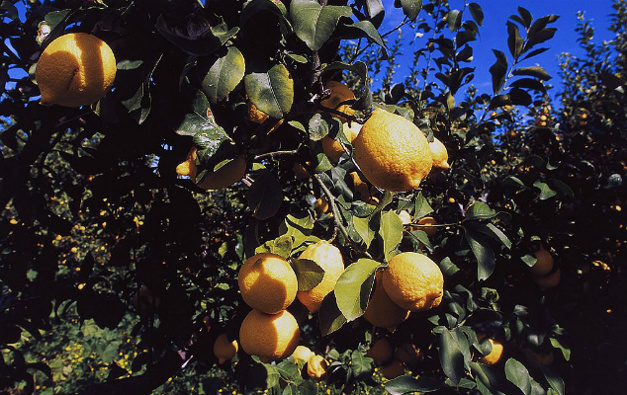Lemon trees
They love a warm, sheltered spot in full sun – protected from wind; usually not good with heavy frosts. (Meyer lemons possibly a few degrees below zero); protect the trees from heavy frosts with frost-cloth….
…or grow them in a large pot that can be moved under frost shelter!
Most citrus varieties are gross feeders – honestly: they’ll reward you with lots of fruit if you fertilise at least THREE TIMES per growing season (Oct – Dec – March); general fertiliser perhaps with some added sulfate of POTASH; “little and often” is the mantra.
Good MULCH (past the drip-line), keep watered; they hate drought!
They’re not good with root competition/crowding; (shallow rooters); keep grass away, especially Kikuyu.
Pollination is usually not a problem; most varieties are “self-fertile”, but watch Meyer Lemons: when they are grown nearby a “seedless” orange, there will be pips – often heaps of them!
Fruit maintenance: Don’t let young trees set too many fruit – prune some off to let the frame-work develop; next year let a few more grow as the tree strengthens its branch system.
(Meyer) Lemons have a habit of fruiting well every second year (usually in winter and spring months); therefore it’s best to plant two or three lemon trees to have a continuous supply of lemons!
Pruning regime: if you need to shape your tree, do it in period March-early September when lemon tree borer are not around to lay eggs on the pruned surfaces. Use Sharp, clean secateurs.
Remove branches from within the bush/shrub/tree – let wind go through it – dries out – less rot.
Pruning cuts don’t need a sealant, but if you’ve had history of die-back (fungal attack) then it will not harm to seal the wound...
Disinfect secateurs from time to time – bleach or janola.
Sooty Mould; If you have sooty mould (fungi growing on sap sucking insect’s excrement) now’s the time to use some spraying oil (Conqueror Oil) to get rid of the cause: scale/mealybug/whitefly)
Neem Oil is often a good, organic suffocator of small sap-sucking insects. Use the Oils frequently (every two weeks or so) and spray both sides of leaves and branches.
There are some root rots (Phytophthora) that can kill a citrus tree very quickly, in a matter of six to eight weeks the leaves go yellow, droop, turn brown and…fall off!
Phytophthora is often spread through ground water (the spot is too wet for too long!).
Dig the tree out and don’t plant another citrus in the same spot.
Maybe put a plum in your Campari?
Take your Radio, Podcasts and Music with you










